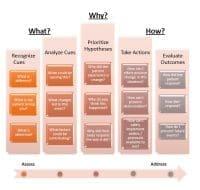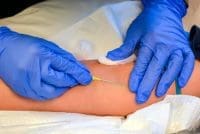Nurses are at the forefront of the coronavirus disease 2019 (COVID-19) pandemic, providing life-saving care for affected patients. Psychological distress can be significant for nurses and other healthcare workers who provide direct care for these patients. To best support nurses, understanding the psychological effects of COVID-19 on them, the impact of secondary traumatic stress (STS), and ways to manage these effects during this stressful time is important.
Psychological impact on nurses
Nurses are facing unprecedented stressors in their professional and personal lives, compounded by uncertainty about the future. For those working directly with COVID-19 patients, fears include being put in the position to care for patients while being understaffed or without life-saving personal protective equipment, which could lead to contracting the disease. Nurses working in other areas, such as outpatient clinics, psychiatric facilities, and residential facilities, may worry about contracting COVID-19 from an asymptomatic patient.
Everyone is experiencing generalized fear for the health and safety of coworkers, former coworkers, and healthcare workers globally. Anyone who has taken a walk outside, visited a grocery store, or seen anyone out in public can attest to the worried glances, intentional spacing, and hurried demeanor on display at all times. However, this worry frequently is greater for nurses due to the possibility of unknowingly contracting COVID-19 and passing it along to other patients at work, those they live with, or members of the community during essential errands.
Other sources of stress include balancing professional and personal lives, such as caring for children who are out of school due to the pandemic or elderly parents who are most at risk for serious morbidity if they contract the disease. Financial stress, grieving life prior to COVID-19, and sorrow over the loss of freedom due to restrictions can compound the distress. Periods of quarantine can pose additional psychological stressors, such as the fear of death and increased emotions of loneliness and anger, along with loss of income and further decrease in social connections.
Studies are emerging on the psychological effects of these stressors for healthcare workers:
- Lai and colleagues found that a considerable portion of healthcare workers in direct contact with patients with COVID-19 in China reported symptoms of depression (50%), anxiety (45%), insomnia (34%), and distress (72%).
- Xiang and colleagues found that healthcare workers interacting directly with patients with COVID-19 have increased levels of anxiety.
- Li and colleagues reported that nurses working with patients exposed to COVID-19 experienced much higher vicarious traumatization scores than those working in other settings. Psychological distress rates were significantly higher for nurses specifically in all of the studies.
Research from other infectious outbreaks can help paint the picture of possible psychological effects related to COVID-19. For example, Alsubaie and colleagues found that during the Middle East respiratory syndrome (MERS) outbreak, healthcare workers’ anxiety was related to several perceived threats, including the possibility of severe illness and death, the fact that no vaccine or evidence-based treatment was identified, and the possibility that the media and social media misrepresented the facts and focused on anecdotal information.
Studies that focus on the psychological impact of the COVID-19 pandemic on nurses will undoubtably continue. While none of the currently available studies looked specifically at STS, this phenomenon has had a well-documented psychological impact on nurses in many fields and may be a significant issue during the COVID-19 pandemic.
Secondary traumatic stress
Similar to compassion fatigue and burnout, STS may occur when an individual is exposed to a survivor who has been traumatized or to traumatic descriptions of events by a survivor. Nurses and other healthcare workers are especially susceptible to STS during the COVID-19 pandemic due to their primary exposure to infected patients and loss of life. Absorbing grief in nursing is nothing new, but the degree to which it’s occurring now is staggering.
STS can impact cognitive, behavioral, and emotional functioning. It can resemble post-traumatic stress disorder (PTSD) symptoms such as depression and anxiety. Cognitive symptoms include decreased concentration, apathy, rigid thinking, perfection, and preoccupation with trauma. A nurse may appear careless at work or hyperfocused on preventive strategies. Emotional symptoms can range from guilt and anger to numbness, sadness, and helplessness. Other signs and symptoms include withdrawal, sleep disturbance, appetite changes, hypervigilance, and elevated startle response. Nurses may appear disheveled, tired, or isolative at work. Physical symptoms include increased heart rate, difficulty breathing, muscle/joint pain, and increased severity of medical concerns; patients also have impaired immune systems.
STS prevention and intervention strategies are needed in the face of COVID-19 to maintain a healthy nursing workforce. Nurses can take steps to care for themselves, but more needs to be done to support them. Colleagues, healthcare systems, and communities also can take steps to support nurses during this stressful time.
Supporting nurses with STS. STS can influence nurse functioning and negatively impact the work environment. Colleagues and healthcare systems must support nurses who may be experiencing STS, which starts with acknowledging that COVID-19 is psychologically affecting nurses. Other strategies for minimizing STS include:
- offering verbal support (but not requiring personal storytelling)
- being available to talk
- assuring nurses that their feelings are normal
- remaining nonjudgmental and not taking their negative feelings to heart
- supporting self-care activities by providing time and space
- encouraging professional help
- assisting in creating a culture that normalizes the effects of working during COVID-19
- supporting a safe work environment
- sharing information on STS.
Self-care
The World Health Organization defines self-care as the ability of the individual to promote health, prevent disease, maintain health, and cope with illness and disability. Self-care is vitally important for mental and physical health, especially during times of extreme stress. Nurses and caregivers commonly stress the need for self-care in others, but ignore their own needs. According to data from ANA Enterprise Healthy Nurse/Healthy NationTM initiative, nurses frequently deprive themselves of sleep, exercise, and nutrition . Although self-care activities during the pandemic need to incorporate social distancing, many activities can be included in a self-care toolkit, including setting a daily schedule, getting outside, and connecting remotely with friends and family.
When nurses take care of themselves, they’re not being selfish. The needs of patients and community members are not more important than a nurse’s needs and well-being. Nurses should feel empowered to reach out for help from colleagues, healthcare systems, and communities when help beyond self-care is needed.
Mental health resources for nurses
Healthcare associations globally are calling for more emphasis on mental health resources for communities and specifically healthcare workers. The declaration of a state of emergency allowed the U.S. Department of Health and Human Services to waive certain federal licensing requirements for providers to expand access to telehealth services. Nurses needing mental health services should look for therapists or psychiatric medication providers in their area offering telehealth appointments. For a list of referrals, nurses can contact their primary care provider, insurance provider, or employee assistance program. Outpatient visits, such as a psychiatric initial assessment and follow-up care, can be provided by telehealth; unfortunately, inpatient treatment isn’t available remotely. Once social distancing is no longer needed, mental healthcare can resume in person.
The National Alliance on Mental Health (NAMI) Helpline is available to provide guidance Monday through Friday from 10:00 am-6:00 pm ET at (800) 950-6264. Nurses who feel overwhelmed by depression, anxiety, or hopelessness should contact the Substance Abuse and Mental Health Service Administration (SAMHSA) Disaster Distress Line at (800) 985-5992 or text “TalkWithUs” to 66746. If you’re having thoughts of harming or killing yourself, contact the National Suicide Prevention Lifeline at (800) 273-TALK (8255) or call 911.
Providing support
Nurses and healthcare workers are currently facing challenges they likely have never experienced before in their careers. Life will return to a more familiar routine and pace, but the timeline is unknown. Nurses must support themselves and their colleagues in the same way they support patients. Addressing psychological distress through proactive self-care, employer support, and community resources has the potential to reduce both short- and long-term psychological effects of COVID-19.
All three authors work at Vanderbilt University School of Nursing in Nashville, Tennessee. Brittany Haskell and Mathew Schroer are instructors in nursing, and Marci Zsamboky is an assistant professor of nursing.
References
ANA Enterprise. Healthy Nurse Healthy Nation year two highlights 2018-2019. Am Nurse Today. 2019. healthynursehealthynation.org/globalassets/all-images-view-with-media/about/2019-hnhn_highlights.pdf
Centers for Disease Control and Prevention. Coronavirus disease 2019 (COVID-19): Stress and coping. April 1, 2020. cdc.gov/coronavirus/2019-ncov/prepare/managing-stress-anxiety.html
Huang JZ, Han MF, Luo TD, et al. Mental health survey of 230 medical staff in a tertiary infectious disease hospital for COVID-19. Chinese Journal of Industrial Hygiene and Occupational Diseases. pubmed.ncbi.nlm.nih.gov/32131151/?from_single_result=Mental+health+survey+of+230+medical+staff+in+a+tertiary+infectious+disease+hospital+for+COVID-19&expanded_search_query=Mental+health+survey+of+230+medical+staff+in+a+tertiary+infectious+disease+hospital+for+COVID-19
Lai J, Ma S, Wang Y, et al. Factors associated with mental health outcomes among health care workers exposed to coronavirus disease 2019. JAMA Netw Open. 2020;3(3):e203976.
Li Z, Ge J, Yang M, et al. Vicarious traumatization in the general public, members, and non-members of medical teams aiding in COVID-19 control. Brain Behav Immun. 2020;S0889-1591(20):30309-3.
U.S. Department of Health and Human Services Administration for Children and Families. Secondary traumatic stress. acf.hhs.gov/trauma-toolkit/secondary-traumatic-stress
World Health Organization. Mental health in emergencies. June 11, 2019. who.int/news-room/fact-sheets/detail/mental-health-in-emergencies
World Health Organization. What do we mean by self-care? who.int/reproductivehealth/self-care-interventions/definitions/en
Xiang YT, Yang Y, Li W, et al. Timely mental health care for the 2019 novel coronavirus outbreak is urgently needed. Lancet Psychiatry. 2020;7(3):228-9.



















2 Comments.
Wonderful article and support ?….a ‘weary/worried’..RN, thank you❤️
Excellent article! Much appreciation for our nurses and all healthcare providers during these challenging days.